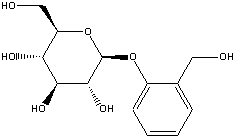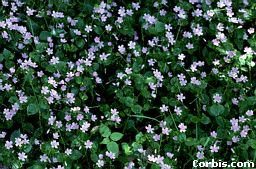The active drug found in willow bark is salicin, which acts in similar to aspirin. The chemical
structure of salicin is:


WHERE DOES WILLOW BARK COME FROM?
There are various types of willow.
The most common willow bark comes from the white willow
tree (Salix alba) which grows in North America, Asia, and Europe.
It is available on the market
as dried bark to make tea, and in tinctures ( in alcohol), glycerine, and
capsules.
WHAT IS WILLOW BARK USED FOR?
Traditionally willow bark was used
as a treatment for all types of pain such as arthritis,
headache, backache, toothache, and menstrual cramps. Because
some people believe it is a
blood thinner, it has also been used to prevent heart attacks and strokes.
WHAT IS THE ACTIVE DRUG IN WILLOW BARK?
The active drug found in willow
bark is salicin, which acts in similar to aspirin. The chemical
structure of salicin is:

WHAT HAVE STUDIES SHOWN?
Willow bark has been proven to reduce
pain. Because the concentration of salicin in willow bark
is so small, it would take several quarts of the herbal tea to equal
a daily dose of aspirin. Tests
have also shown that salicin is not a blood thinner, and therefore will
not prevent heart attacks or
strokes.
WHAT ARE THE SIDE EFFECTS OF WILLOW BARK?
Some immediate side effects include allergic
reaction in the form of itching or hives, and an upset
stomach. Because willow bark contains chemicals called tannins, long
term use can result in liver and
kidney damage.
WILL IT INTERFERE WITH OTHER MEDICATIONS OR MEDICAL
CONDITIONS?
Willow bark should not be taken by women
who are pregnant or nursing. Children who have the flu
or chicken pox should not take willow bark because it may cause Reye's
syndrome. People who have
bleeding, liver, or kidney problems, ulcers, asthma, or diabetes should
refrain from taking willow
bark or products with willow bark in them. Those who are allergic
to aspirin or are taking any other
NSAIDs (non-steroidal anit-inflammatory drugs), such as ibuprofen, should
stay away from the herb.
WHAT ARE TYPICAL DOSAGES?
Dosage information represents commonly used practices; it is not a recommendation.
Doses are
given for single herb use and must be adjusted when used in combination
with other drugs or herbs
or due to the severity of the condition being treated.
Tincture or glycerin: 1/2 to 2 teaspoons of bark per cup of water, boiled
for five minutes
Taken three to five times daily
Liquid extract: 1-3 ml three times daily
Capsules: Two to three 379 mg capsules taken every 3-6 hr.
Topically: Infused in vegetable oil and rubbed over painful joints or muscles
as needed
WHAT IS IMPORTANT TO KNOW ABOUT WILLOW BARK?
This natural medicinal herb contains a
substance called salicin. It has been used as a natural cure to
help break fevers, alleviate headaches, and reduce pain and swelling in
joints. Willow bark tea is
very bitter. Herbal products may contain chemicals or other species
of plants that are not listed on
the label. Herbs can cause unwanted reactions between other herbs
or medications. Many herbal
remedies containing willow bark claim that it is aspirin free, however
salicin, the active ingredient,
converts to aspirin while in the body. This could cause problems
for people who are allergic to
aspirin. Tannins, another active chemical found in willow bark, is
also present in foods such as sorrel
and rhubarb. Commonly used as topical treatments for poison ivy,
they have also been used internally
to treat diarrhea and inflamed mucus membranes. This could be dangerous,
however. Because willow
bark contains between 8 and 20% tannins (above 10% can be harmful), a higher
concentration
than in most other plants, there is an increased risk of adverse effects
including upset stomach, nausea,
renal damage, and esophageal and nasal cancer with long term use.